Social Responsibility
"Caring enough is the commitment to ‘Do things better’ – not just for the business but for the world at large. We undertake multiple initiatives to strengthen communities."
Please fill in the details below:
"Caring enough is the commitment to ‘Do things better’ – not just for the business but for the world at large. We undertake multiple initiatives to strengthen communities."
To see a need and to take the initiative to answer it. To see an opportunity and to develop solutions. That's what we do.
UPL Limited built institutions of excellence to improve quality of education and to raise responsible and skilled human capital in the region.




UPL Limited is working to promote sustainable livelihoods, which is a coherent and integrated approach to improving the quality of life of the farmers, rural youth and women. Our programs aim at providing ecologically, economically and socially sustainable opportunities to all sects of the society.
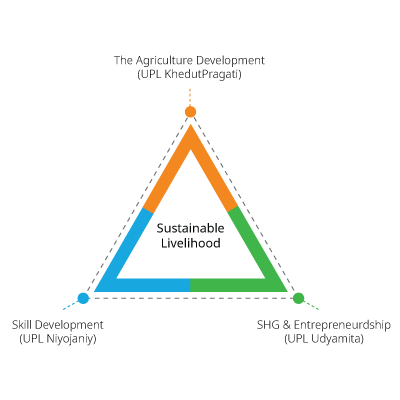

UPL Agriculture Development @ Dang
UPL Agriculture Development @ Ankleshwar
UPL Agriculture Development @ Jhagadia
UPL Agriculture Development @ Vapi
UPL AKRSP(I) SRI
Livelihood Enhancement of Tribals (Waghai block)
UPL BoriBagicha
Animal Husbandry
Agriculture Market Linkage
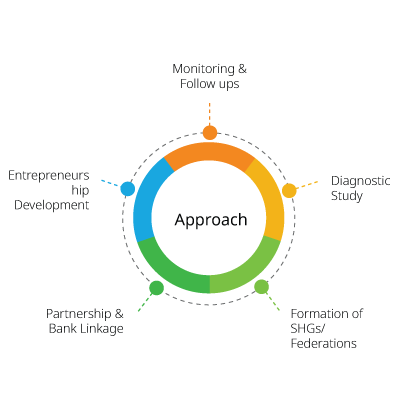
UPL Udyamita
Establishment of Micro-Enterprise
Skill Based Entrepreneurship Development


Apart from providing vocational skills, the centers also work on enhancing students’ personality, teaching them specific life skills like interpersonal communication, time and stress management, positive attitude, computer skills and more. It also facilitates placement of students in various industries at the end of the program. Till date, we have trained 1,327 youths and out of which 798 youths have been placed in different industries. Third Party Assessment in the year, 2016 of this program reveals that average monthly income of youth in the region increased from INR 4,750/- to INR 7,750/- which was an increment of 63% in income after getting trained. Further, it is recorded that the average monthly salary received by our students was Rs 8,250 in 2018-19, which was 13% more than the previous year’s monthly salary.
UPL Limited also partnered with 2 ITI’s (Industrial Training Institute) under Public Private Partnership model (ITI Surat- Mahila & ITI Amod).This would enable us to share our industrial expertise and technical know-how with these institutes and help them become better.
UPL Limited also provided training to youths on creating awareness on Farm Mechanisation with the name AdarshMitra Training. In the year 2018, a total of 13 training sessions were conducted. 600 youths received training on farm mechanisation and 175 candidates were selected as Machine Operator (160) and (15) Officer.,
Depleting forest lands, high levels of pollution (air, water and noise), decreasing sensitivity towards nature and irresponsible actions have been disturbing the ecological balance in the region which can have long term repercussions. To overcome these issues, UPL Ltd initiated various efforts to conserve environment & improve quality of life of flora and fauna.
Children are the flag bearers of our future. They must be made sensitive towards the environment and responsible towards actions which impact the surrounding. The objective of this program is to make the young generation conscious about the importance of nature preservation and conservation and inculcate good practices amongst them. The Eco or Vasudha Clubs have been formed in schools and students participate in environment related activities through these clubs
We have formed Eco Clubs in community schools (10-15 students per Ecoclub). The enthusiastic, environmentally concerned and socially committed students are chosen from each school as Eco Club members and are involved in taking up meaningful environmental activities and project in their respective schools and vicinity. They manage the green activities such as growing trees, developing medicinal garden, cleaning-up activities such as collecting waste, recycle and reuse. They are actively involved in the conservation of locally threatened flora and fauna. As of March 2019, We have formed 85 EcoClubs of 3396 EcoClub members in community School with 11040 students.
UPL Ltd in association with Parisar Asha took the environment initiative to school children in Vapi and Mumbai through the Green Ganesha Workshops. Every year the programme implemented in different schools in Mumbai, sensitizing the children about the ill effects of POP idols. The materials used extensively for the creation of Ganesha idols create havoc in the environment. Hence a need to use of eco-friendly Ganesha idols. This initiative creates awareness within the society to stop this idol humiliation & environmental pollution. This workshop also provides joy and satisfaction of creating Ganesha from eco-friendly shadu clay and acts as a stress buster for the participants. In last 4 years we have conducted workshop in 77 schools in Mumbai and have sensitized 8590 students about the ill effects of POP idols.


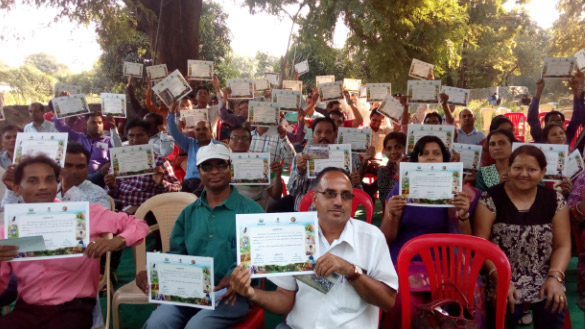
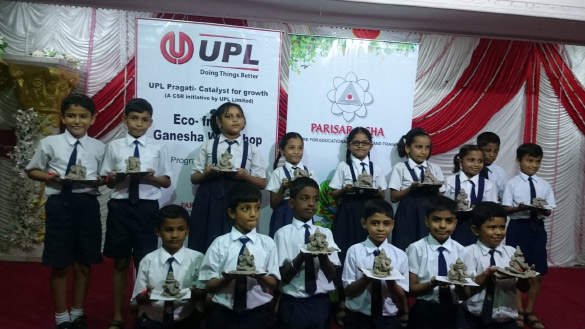
Indian Sarus crane, the tallest flying bird is categorized as vulnerable on the IUCN’s (International Union for Conservation of Nature) Red List. Sarus Crane (Grus Antigone Antigone), a resident species is known to use wetlands and agriculture fields and live in association with human beings. The species is totally dependent on the human approach for its survival and coexistence. Wetlands, marsh lands and ponds are the most preferred habitats followed by agriculture fields for breeding and foraging by the species. Kheda district in Gujarat hosted the highest population of Sarus cranes in the past, but this species faces extinction due to manmade constructions and activities that erode its nesting and breeding sites. Habitat loss becomes a threat to their existence. Kheda district alone in Gujarat, the highest crane number from the state i.e. 737 Sarus Cranes were reported in 1998, while in 2010, GEER foundation reported that there is decrease in Sarus and reached 437 combining Anand and Kheda.
UPL Ltd initiated “UPL Sarus Conservation” programme with an objective of the project is to preserve Sarus through a participatory approach involving farmers and other stakeholders.
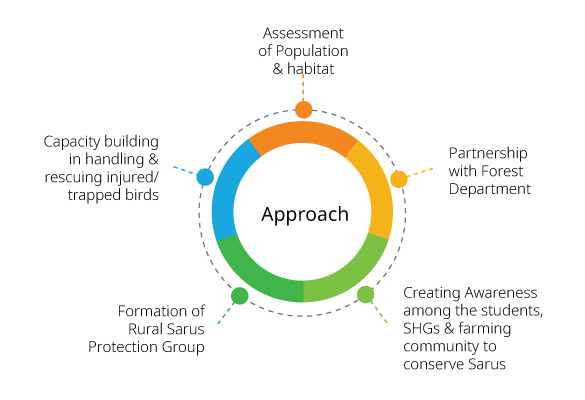
The project has documented the population; abundance and distribution of the species. Total 726 Sarus cranes were documented from Kheda district. Seven summer and four winter congregation sites were identified. The highest number of Sarus crane during summer was observed at Vanktalav of 168 Sarus cranes. While in winter highest congregation of Sarus crane was recorded in Limbasi (170) Sarus crane was recorded in agricultural field.
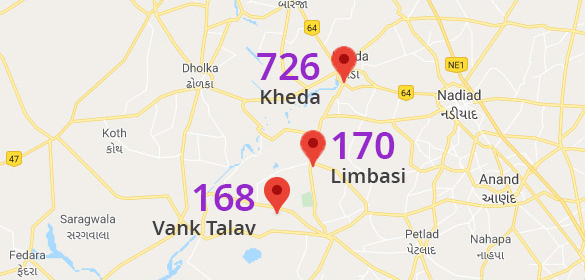
Social forestry means the management and protection of forests and afforestation of barren and deforested lands with the purpose of helping in the environmental, social and rural development. The government has been trying to increase forest areas that are close to human settlement and have been degraded over the years due to human activities. Under Social Forestry the community is encouraged to plant trees in village common land, government wasteland and Panchayat land. Social forestry also aims at raising plantations by the common man to meet the growing demand for timber, fuel wood, fodder, etc., thereby reducing pressure on traditional forest areas. Social Forestry also formally recognizes the local communities’ rights to forest resources and encouraging rural participation in the management of natural resources.
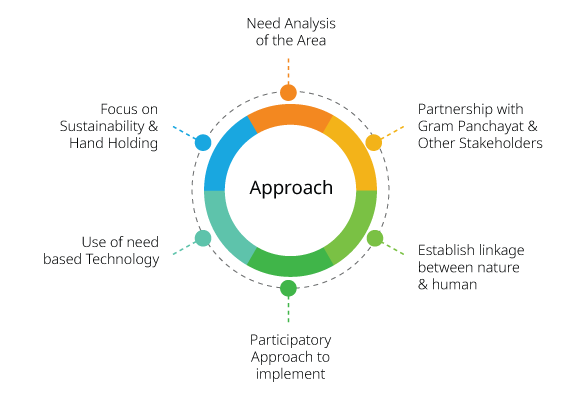
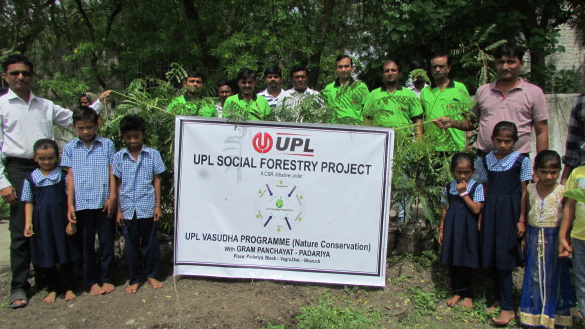
Since independence, we achieved many milestones and considered to most progressing country in term of technology, education, infrastructure development and others. However, in term of sanitation, performed very off-color and struggling with authentic independence. Revealed in “2014 Annual status of Education Report (ASER)” 45% of Indian schools don’t have access to a toilet or there are toilets that student can’t use and, so, must urinate or defecate in the open in or near schools. Study of a national NGO reveled that in over 60% of the schools surveyed, students avoid using the school toilet. The main reason for this is lack of hygiene or (in case of girls) privacy. Data reveal that there is a correlation between the lack of toilet and dropout rates. One can recall the famous quote “Sanitation is More Important than Independence" … Mahatma Gandhi.
Awareness of the sanitation has also been widely observed in last 4 years in every villages of India after the initiatives of “Swachh Bharat” Hon’able Prime Minister, Shri Narendrabhai Modi. Considering the seriousness of the nation and the local need of the schools, UPL Limited has decided to take the initiative to provide world best class toilet and sanitation facilities to the Government primary schools.
To improve the overall sanitation environment in the rural areas, we conduct community awareness drives about hygiene practices and behaviour. These programs are mostly conducted in schools so that children become the torch bearers of cleanliness and spread the message in the community
As of March 2019 total 47 school sanitation blocks built, 9,225 students are using the facility regularly and 3,000 commuters/ day are using the facility at the community place.
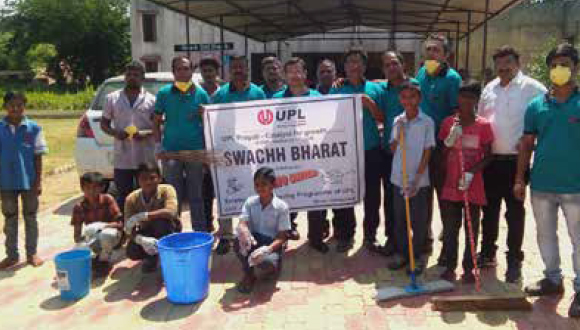
Safety of girls is of paramount importance. Our attempt is to make the adolescent and young girls aware about various aspects of safety
This program is conducted with the ITI students who are going to join the industrial workforce in the future. It is imperative to prepare them for a safe work life in industries. Use of safety equipment at all times, do’s and don’ts within the industrial unit, measures to avoid industrial accidents and what to do in case of an accident are the focus points of the program
A majority of the accidents on the road happen because people do not follow road safety rules. Either there is a lack of awareness about the same or simply an attitude of negligence
Many accidents at home go unnoticed like fire accidents in kitchen, electric shocks, trips and falls, harm from hazardous material etc.
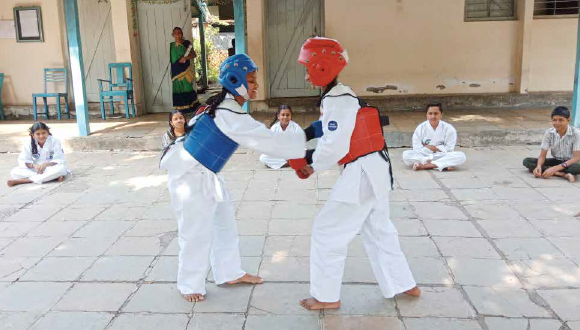
We believe in creating capacities of civil society organizations including Non Govt. Organizations (NGOs) and Community Based Organizations (CBOs). These organizations have strong community connect and bring their expertise to the table. At the same time they need to improve their processes and systems to enhance their effectiveness. UPL Unnati is a step in this direction. We work on enhancing the administrative and management systems of the civil society organizations in order to improve their project deliverables.
Top management of UPL actively participates in the program and gives their valuable inputs to these organizations in setting up their management systems like information management, financial management and human resource management.
With a goal to improve project level efficiency and effectiveness of these organizations, Unnati in its 1st phase worked with 6 CBOs from Mumbai during 2016-18. For the 2nd phase (2019-21), we are working with 3 more organizations in Mumbai cumulatively with more than 10000 women are working with these organisation.
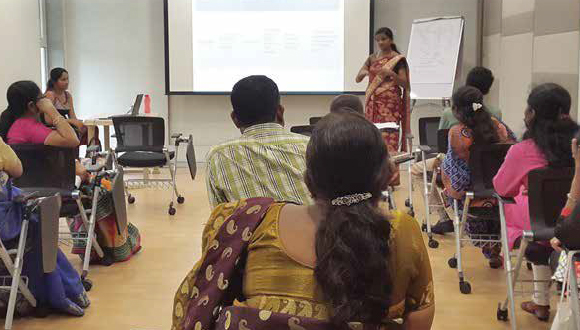
Vandri is the remotest village of Dumkal Gram Panchayat of Narmada District of Gujarat state. The tribal village lacked basic amenities and institutional infrastructure. Villagers were totally dependent on rain fed agriculture and no second crop could be taken on the hilly terrains due to absence of water harvesting structures resulting mass migration to make both ends meet. Need-based approach adopted to implement the activities
As of March 2019, 436 farmers have been benefited in various activities of this cluster.
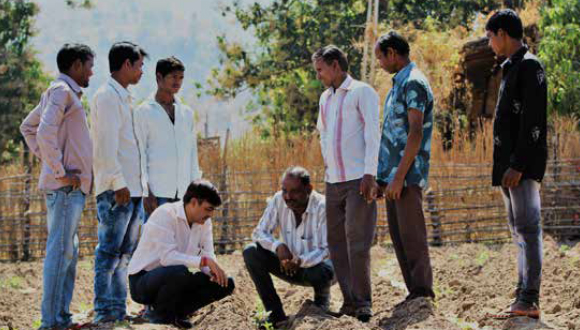
Global Parli was started as a pilot project to showcase how villages of India can be transformed into model villages through revival and empowerment. The idea was to create progressive, economically viable and prosperous villages for a new India. This project is being implemented by “Global Parli” team under the leadership of Mr. Mayank Gandhi. UPL is supporting the Global Parli project to develop replicable model of Rural Rejuvenation by providing financial, technical & management support to the project
The project works with 15 villages in drought-prone Parli tehsil in Marathawada (Maharashtra-India) for over- all development.
As of now more than 10 lakh fruit trees saplings have been planted in the 106 villages of Parli Taluka to improve the ecology of the area and benefited 726 farmers in the region.
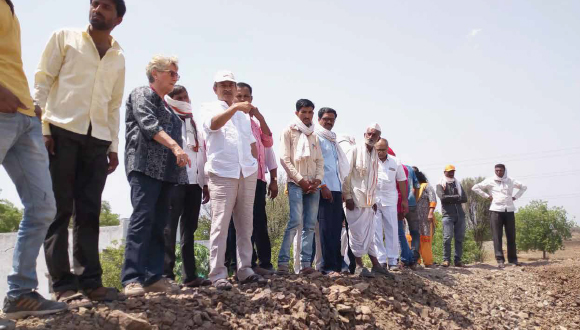
Under the initiative of UPL GramPragati, UPL Limited created a model schools at Dahej, Bharuch, Gujarat. UPL Constructed school building and sanitation block for Shree Sharda Vidya Mandir at Kadodara. With new school building, this year the school will witness maximum number of students enrolling and successfully pursuing their education – which is the dream of every child.
In 2017 Assam witnessed one of its worst deluge in the last 3 decades, devastating the lives of lakhs of people and destroying thousands of hectares of crop area. The Government of Assam immediately started relief work, but the impact of the flood was such that the rehabilitation efforts required support and contribution from multiple organizations. UPL decided to help in this process of rebuilding and rehabilitating the flood affected people to their normal lives.
As a responsible corporate citizen UPL contributed Rs 25 Lakhs to the Chief Minister Relief Fund of Assam to aid in the rehabilitation of the flood affected people of the State.
Gujarat was affected by severe flooding. Banaskantha received more than 250% of the average rainfall during the same period. It was close to the heaviest rainfall in 112 years in the affected region. Thousands of people were evacuated to safety and Food was required immediately for thousands of people. UPL immediately got food packets made in factory canteen and sent the same to the affected people through government machinery.
In the developing world, child labour can still be found in many parts of everyday life. This is a cultural issue and needs to be sensitively addressed in a holistic manner. UPL’s Advanta team is implementing a CSR initiative called ‘United Against Child Labour’ (Project UACL) with the objective to eliminate all forms of child labour in seed supplier farms and to ensure education for children. The first awareness program on the issues related to child labour of 2018-19 under Project UACL was held at Jambhora of Buldana district in Maharashtra, India on 21st Nov 2018 while the second was conducted at Koppal, Karnataka, India. Emphasis was laid on the importance of education for children at these events. The events saw participation from the UPL Advanta team, government agriculture officers, government education officers and the farming community.
Read More
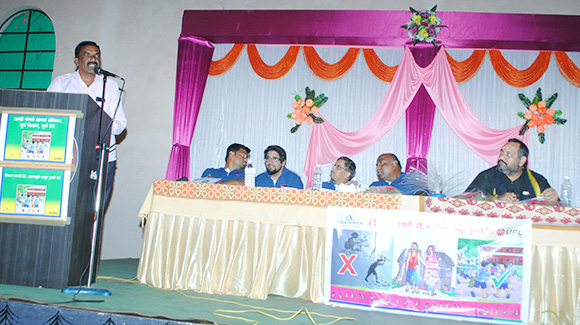
We Are United (WAU) is an Employee Volunteering Programme of UPL Limited and is started with an objective of taking ‘Employee Volunteering’ forward at UPL plant locations in structured manner.
WAU promotes the spirit of contribution to society with a believe that every employee must be given an opportunity to put their skills and passion for the larger goal of development, beyond the realms of their work life. Our WAU Volunteers have always come forward and given their best. They have been instrumental in spearheading many programs in the neighboring communities.
details of volunteer devoted in various community devlopment program
18-19
4863 hours
608 man days
17-18
3032 hours
378 man days
16-17
3866hours
483man days
15-16
3871 hours
484 man days
14-15
2727 hours
341 man days
DISCLAIMER
“UPL and its subsidiaries have made every attempt to ensure accuracy of the information provided on this website. However, this is a global webpage with access to different geographies for wider reach and greater awareness of UPL. In the course of doing the same, UPL has used Weglot translator plugin to cover the language of this website from English to select regional languages.
UPL therefore, does not accept any responsibility or liability on the nature, standard or the accuracy of the translation and cannot take responsibility for any type of inaccurate contextual meaning in the event of a mismatch from English to a regional language.”